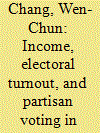| Srl | Item |
| 1 |
ID:
134974


|
|
|
|
|
| Summary/Abstract |
In this article I examine changes in the election manifestos of Japan's Liberal Democratic Party. While the existing literature agrees that the LDP's policy platform has changed considerably since the introduction of the new election system in the 1990s, their analysis focuses on material policies such as pork barrel and welfare. Postmaterialist policies such as environmental protection have hardly been discussed, even though they have been relevant since pollution swept progressive mayors into power in the 1960s. I examine election platforms from 1956 through 2013, and argue that the LDP has carefully adjusted its policy mix by putting a greater emphasis on postmaterialist policies. My analysis also shows that while electoral reform has had an impact on the policy balance between postmaterialist and materialist policies as well as clientelist and programmatic policies, these changes are not linear, but vary from decade to decade.
|
|
|
|
|
|
|
|
|
|
|
|
|
|
|
|
| 2 |
ID:
134975


|
|
|
|
|
| Summary/Abstract |
What explains the electoral staying power of many Japanese interest groups in the wake of electoral reform? Electoral explanations provide part of the answer; candidates in elections to both houses of the Diet continue to face incentives—many of them unintended—to court the organized vote. But missing from such accounts is an explanation of why economically noncompetitive groups provide the bulk of such support. The primary reason for this, I argue, is organization. As a result of their historical linkages to the bureaucracy, many interests developed hierarchical, national organizational structures that enabled them to carry out a variety of vote-gathering functions that the parties had trouble performing themselves. Although electoral reform and long-term demographic trends have weakened the electoral influence of interest groups, these organizational complementarities between groups and the parties continue to matter in Japanese elections—including under conditions of two-party competition. To illustrate these points, I trace the evolution of interest group politics from the era of LDP dominance through the rise of two-party competition and the LDP's recent return to power, using postmasters associations and agricultural cooperatives as case studies.
|
|
|
|
|
|
|
|
|
|
|
|
|
|
|
|
| 3 |
ID:
134972


|
|
|
|
|
| Summary/Abstract |
Using data drawn from the Taiwan Social Change Survey, I investigate how citizens' incomes affect turnout and partisan voting. In contrast to studies of other countries, I find that lower-income voters are not less likely to turn out in Taiwan. Moreover, although income does not have strong effects on patterns of partisan voting in Taiwan, there is some evidence that people with income levels just below the middle-income group are less likely to vote for the left-wing party.
|
|
|
|
|
|
|
|
|
|
|
|
|
|
|
|
| 4 |
ID:
134971


|
|
|
|
|
| Summary/Abstract |
Based on a 2011 national survey, I argue that while US conservatives feel somewhat cooler toward the East Asian democracies than US liberals do, they feel much cooler toward China. Greater average conservative than liberal prejudice lingers, cooling attitudes toward the “Yellow Peril” of all Asian countries, but communism is a larger source of ideological differences over China. For cultural, social, economic, and political reasons, conservatives feel substantially cooler than liberals toward both communist countries in general and “Red China” in particular. I conclude by suggesting that with gerrymandering and ongoing ideological sorting, these ideological differences over China on Main Street may come to play a greater role in the making of US China policy.
|
|
|
|
|
|
|
|
|
|
|
|
|
|
|
|
| 5 |
ID:
134973


|
|
|
|
|
| Summary/Abstract |
More than ninety people died in political violence linked to the March–May 2010 “redshirt” protests in Bangkok. The work of the government-appointed Truth for Reconciliation Commission of Thailand (TRCT) illustrates the potential shortcomings of seeing quasi-judicial commissions as a catch-all solution for societies struggling to deal with the truth about their recent pasts. The 2012 TRCT report was widely criticized for blaming too much of the violence on the actions of rogue elements of the demonstrators and failing to focus tightly on the obvious legal transgressions of the security forces. By failing strongly to criticize the role of the military in most of the fatal shootings, the TRCT arguably helped pave the way for the 2014 coup. Truth commissions that are unable to produce convincing explanations of the facts they examine may actually prove counterproductive. Following Quinn and Wilson, we argue in this article that weak truth commissions are prone to politicization and are likely to produce disappointing outcomes, which may even be counterproductive.
|
|
|
|
|
|
|
|
|
|
|
|
|
|
|
|